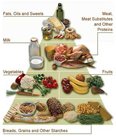Minerals Overview
A to Z Minerals
age-well.org > Vitamins and Minerals – Introduction > A -Z Minerals – Page 1 -Macro Minerals

Click for
TABLE OF CONTENTS
This Overview is an easy to use A-Z containing all you need to know about the different minerals necessary for your health.
These nutrients are imperative for many metabolic functions. These inorganic nutrients are used for healthy cell function, strengthening of bones and teeth and acting as coenzymes. There are fifteen known minerals that we require and these can be divided into two groups: Macro and Micro-minerals (or trace elements). This overview is also divided using this criterium.
Macro-minerals are needed in larger doses (100g or more daily) whereas trace elements (the micro variety) are needed in smaller quantities (less than 100g daily). Trace- elements are needed in smaller doses as too much of these can be toxic to the body.
These nutrients make up approximately 4% to 5% of our total body weight. They are ingested either when they are located in other foods or separately as dietary supplements. They can be obtained by eating foods originating from plants and animals, as they too require minerals to function. We can absorb the required amount on a daily basis, simply by eating a balanced diet. However, supplements can be taken to ensure sufficient quantities. These, as with any anti-aging supplement should be obtained from a reliable source, such as
xtend-life supplements.
Anti-aging products from Xtend Life (a reliable source)
TABLE OF CONTENTS
Macro-Minerals
Calcium (Ca)
Magnesium (Mg)
Phosphorus (P)
Micro-Minerals
Chromium (Cr)
Copper (Cu)
Chlorine (Cl)
Fluoride (F)
Iodine (I)
Iron (Fe)
Manganese (Mn)
Molybden (Mo)
Potassium (K)
Selenium (Se)
Sodium (Na)
Sulfur (S)
Zinc (Zn)
Macro-Minerals
Functions: : It is important for bone and teeth formation and structure. It is also a component of enzymes that contribute to blood clotting, muscle activity and nerve function.
Food Sources: Milk, cheese, fortified bread and flower, yoghurt, tofu, cereals and green vegetables
Deficiency: although there are no immediate effects, hypocalcaemia can occur (this is usually due to other medical issues). Symptoms of hypocalcaemia include muscled cramps, numbness and tingling of the fingers, lethargy, convulsions, poor appetite and abnormal hear rhythms.
OverdoseAs mentioned elsewhere in this overview minerals, it is important not to take more than the recommended amount of any mineral. Symptoms of calcium overdose include drowsiness, muscle weakness, nausea and vomiting, frequent urination, constipation or diarrhea, confusion, changes in heart rate headaches and eventually coma.
Recommended Daily Intake: 1300 mg
More in-depth information on Calcium
Functions: : Important factor of bone formation, muscle and nerve function and a component of coenzymes.
Food Sources: fish (e.g. halibut, tuna and salmon), nuts, beans, pumpkin seeds, spinach, potatoes and some bread and cereal products.
Deficiency: symptoms include nausea, vomiting, fatigue, weakness and loss of appetite. Severe magnesium deficiency can result in arrhythmias, increased nervous irritability, and hypocalcaemia and hypokalemia (low potassium levels in the blood).
Overdose This usually occurs when taking medications that contain magnesium such as antacids and laxatives. Symptoms of magnesium overdose include drowsiness, cardiac arrhythmias, muscle weakness, decreased reflexes, hypotension, difficulty concentrating and staying alert and decreased rate of breathing.
Recommended Daily Intake: 420 mg
More in-depth information on Magnesium
Functions: Important for bone and teeth formation, used in protein synthesis (for cell growth and repair), used to produce ATP and contributes to the body’s ability to use fats and carbohydrates.
Food Sources: milk (milk products), cheese, bread and cereals, meat and meat products and fruits contain small amounts of phosphorus.
Deficiency: Very uncommon as it is found in many Food Sources in sufficient quantities.
Overdose This only occurs in people with kidney or calcium regulation related diseases. Excessive phosphorus will combine with calcium to form deposits of tissue.
Recommended Daily Intake: 700 mg
Overview - Micro-Minerals
Part two of this overview concentrates on the trace elements.
Return from Minerals Overview to age-well.org
Enjoy this page? Please pay it forward. Here's how...
Would you prefer to share this page with others by linking to it?
- Click on the HTML link code below.
- Copy and paste it, adding a note of your own, into your blog, a Web page, forums, a blog comment,
your Facebook account, or anywhere that someone would find this page valuable.















